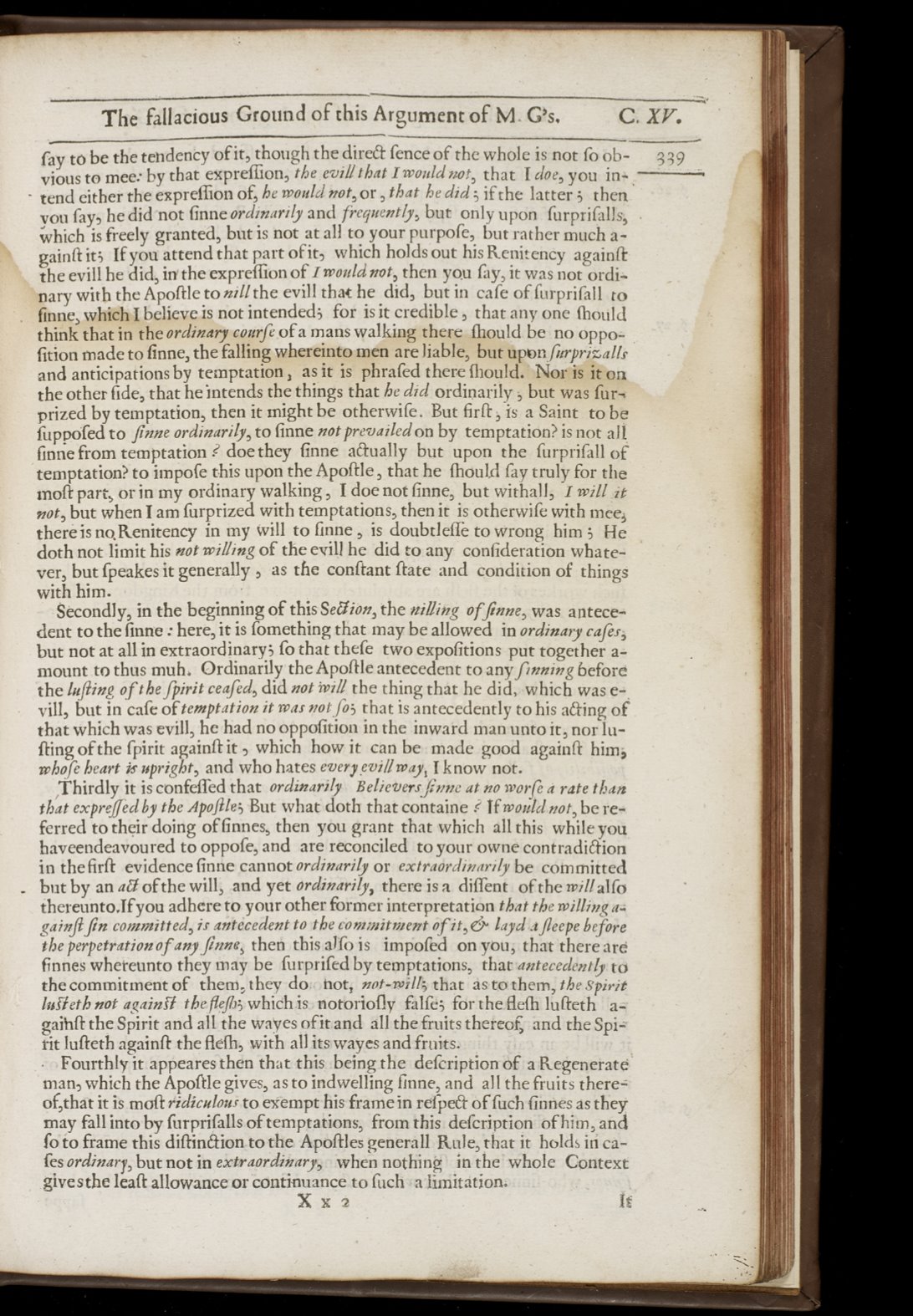

The
fallacious
Ground
of
this
Argument
of
M.
Gis.
C.
XV.
fay
to
be the
tendency
of
it,
though
the
dire& fence
of
the whole
is
not
fo
ob-
339
vious
to
mee: by
that
expreffion,
the evill
that Iwouldnot,
that
I
doe,
you
in-
tend either the
exprefíìon of
he
would
not
or,
that
he
did; if
the
latter;
then
vott
fay, he
did
not
finneordinarily
and
frequently,
but
only upon furprifalis,
which
is
freely
granted, but
is
not at
all
to
your purpofe, but rather
much
a-
gainft its
If
you
attend that part
ofit,
which holds
out
his
Reniteney againfi
the
evill he
did, in the
expreffron
of
I
would
not,
then
you
fay,
it
was
not
ordi-
nary
with the
Apofile
to nill the
evill
that
he
did, but
in
cafe
of
furprifall
to
finne,
which I believe
is
not intended; for
is
it credible
,
that
any one fhould
think
that
in
the
ordinary
courfe
ofa
mans walking
there
fhould be no
oppo-
fition
made to
finne,
the
falling
whereinto
men
are liable,
but
upon
furpriealls
and
anticipations
by
temptation
,
as
it
is
phrafed there fhould.
Nor
is
it
on
the other
fide,
that
he intends the things
that
he
did
ordinarily, but
was fur-,
prized
by
temptation, then it mightbe otherwife.
But firfi
is
a
Saint
to
be
fuppófed
to
finne ordinarily,
to
finne notprevailedon
by temptation?
is
not all
finne
from temptation
?
doe they
finne
a
&wally
but
upon
the
furprifall
of
'temptation?
to
impofe this upon
theApoftle,
that
he íhould
fay
truly
for
the
moil part, or
in my
ordinary
walking
, I
doe not
finne,
but
withall,
i
will
it
not,
but
when I am
furprized
with
temptations, then it
is
otherwife
with inee,
there
isno,Renitency
in my will
to
finne
,
is
doubtleffe
to
wrong
him;
He
Both
not
limit
his
not willing
of
the
evil]
he did
to
any confideration
whate-
ver,
but
fpeakes
it
generally ,
as
the
confiant fiate and condition of things
with him.
Secondly, in
the
beginning
of
this
Seelion,
the
Willing
o
f
finne,
was
antece-
dent
to
the
finne :
here,
it
is
fomething
that
may be
allowed
in
ordinary
cafes,
but
not at
all
in
extraordinary;
fo
that
thefe two
expofitions
put together a-
mount to
thus muh.
Ordinarily the
Apofile
antecedent
to
any
finning
before
the
lufling
of
the
fpirit
ceafed,
did
not
Will
the
thing
that
he did, which
was
e-
vill,
but
in cafe
of
temptation
it
was
not
fo; that
is
antecedently to
his
a
&ing
of
that
which
was evill,
he
had
no oppofition
in
the inward
man
unto
it;
nor
tu-
ftingof
the
fpiritagainfiit,
which
how
it
can be made good againfi him;
whofe
heart
is
upright,
and who hates
every
evill
may,
I
know not.
Thirdly
it
is
confeffed
that
ordinarily
Believers
finne
at
no worfe
a
rate than
that
expreffed
by
the
Apofile;
But
what doth that
containe
?
If
would
not,
be
re-
ferred
to
their doing
of
finnes,
then you
grant that
which all this while you
haveendeavoured
to
oppofe,
and are
reconciled
to
your owne contradi
&ion
in thefirft
evidence finne
cannot
ordinarily
or
extraordinarily
be committed
but
by
an
all
of
the
will, and
yet
ordinarily,
there
is
a diffent
of
the
willalfo
thereunto.Ifyou adhereto
your
otherformer interpretation that
the willing a
gainftfin
committed, is antecedent
to
the commitment
ofit,60
layd a
fleepebefore
the perpetration
of
any
finne, then this
al'fo
is
impofed on
you,
that there
are
finnes
whereunto they
may
be furprifed by temptations,
that
antecedently
to
the commitment
of
them,
they
do
Pot,
not -wills
that
as
to
them,
the
spirit
lull
eth
not againsi the
flefh;
whiéh.is
notoriofly falte;
for
the
Beth
lufleth
a
gaihft
the
Spirit and
all
the
wages
of
it
and
all
the
fruits thereof, and
the
Spi-,
rit
lufteth againfi
the
flesh;
with
all
its wayes and fruits.
Fourthly it
appeares
then
that
this
being
the
defcription
of
a
Regenerate'
man,
which
the
Apofile gives,
as
to
indwelling
finne,
and
all
the fruits there
of,that
it
is
molt
ridiculous
to
exempt
his
frame in
refpe&
of
fuch finnes as
they
may
fall
into by furprifalls
of
temptations,
from this defcription
of
him,
and
fo
to
frame this diftin
&ion-to
the
Apofiles
generali Rule,
that
it holds
in
ca-
fes
ordinary,
but
not
in extraordinary, when
nothing
in
the whole Context
givesthe
leafs
allowance
or
continuance
to
fuch
a
limitation.
X
x
?
Ir










